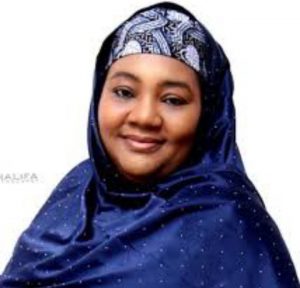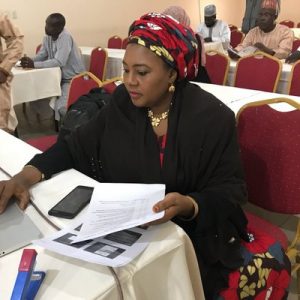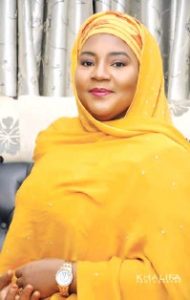A professor of Business Administration, Maryam Abubakar Koko is the Director of Centre for Entrepreneurship, Usmanu Danfodiyo University Sokoto. She hails from Koko in Base local government of Kebbi state. She had her first education at Koko Salihu Model Primary School and went to Federal Government Girls College, Gusau for her secondary education graduating in 1994. She then went Sokoto College of Art and Science, now Shehu Shagari College of Education and then to Usmanu Danfodiyo University Sokoto for a degree programme in Management Studies. In 1999, Maryam continued with her Masters Degree in Business Administration. In 2002, she got employed by the university as a non-academic staff – Auditor. However, her passion for teaching made her convert to academic staff as assistant lecturer and later applied for her PhD in Business Administration. Maryam did her research in Women Entrepreneurship. Prof. Maryam is a Fellow of the Institute of Certified Management Consultants; Fellow of the Association of Business Specialists and Entrepreneurs; A student-member of the Institute of Chartered Accountants; A certified member of National Industrial Development Organisation Trainer and a graduate of Pan-Atlantic University Lagos. She gives lectures, seminars on entrepreneurship. In this exclusive interview with ASHENEWS, she speaks about women entrepreneurship generally, the Centre for Entrepreneurship, Usmanu Danfodiyo University Sokoto and many more. Excerpts:

How is women entrepreneurship in Sokoto like?
Women entrepreneurship in Sokoto is really encouraging in the sense that many women have now embraced it. I can tell you that we have more than five groups of women at this Centre for Entrepreneurship. It is encouraging. I remember a friend went for YouWin training program in Kano and won a YouWin grant. At the training in which only four from Sokoto attended, she found out that more than 100 people had won the YouWin grant. She found out that women operate in groups; train in groups and do networking activities. On her return, she suggested to that we should do something about women entrepreneurship in Sokoto. So, we started the Association of Women entrepreneurship, ANWE, and we now have more than five women entrepreneurship groups outside this Centre.
It is compulsory for all students of universities in Nigeria to run one entrepreneurship programme or another at 200 and 300 levels.
These groups organise activities, including trade fairs, workshops, seminars, etc. Women entrepreneurship groups are gaining ground in the sense that we have many of them right now with their leaders. I think the last time I was invited to speak on a radio programme, ‘Muryar Arewa’, I advised them to have a common group where these leaders of entrepreneurship groups will come together. In entrepreneurship, there is what we call incubation, which we don’t embrace. Everybody will just produce and starts packaging products and think he is capable of doing it. This is why many businesses do not grow. There are steps upon which these women need to improve their products, especially in the areas of product quality, packaging, labelling, marketing and what have you. We are doing more for these groups to work on improving the standard of the products so that the products can sell in their localities.

Tell us about the UDUS Entrepreneurship Centre.
The centre was created in 2012 with the mandate of equipping students and community with sustainable entrepreneurship knowledge, norms, skills, culture and innovation. The centre provides full range of business application and support services for students and the community within the context of these mandates. At that time, I was the Deputy Director. I was assisting the first Director, Professor Nasiu and was working from our offices at the department of business administration. This building now housing the Centre was not constructed. I became the director after his tenure expired. The first thing I did when I became Director was to develop a working document that was targeted to change the narrative. Initially, we had Student Entrepreneurship and General programmes.
It is a pride that we have attracted big names like UBEC, YouWin and Hult Prize Foundation to the Centre. We will continue to attract other individuals and organisations for the growth of the Centre
YouWin have sponsored some of our programmes and gave us books and took data of all the students. One of the biggest strategies I have used is to look for supporters from the general public who support us in whatever we do. We hosted the Hult Prize Foundation. The two programmes by YouWin and Hult Prize Foundation were simultaneous – 11th and 12th. It was one of its kind for students because it was a competitive presentation of our best three. Since then, we have been getting a lot of encouragement and motivation. The Universal Basic Education Commission, UBEC, has contributed in the development of this Centre. I approached the Commission in Abuja when I went for the Hult Prize and believe me, I came back with the project worth N50 million and it was erected in three months. I thank God for the simple and straightforward vice chancellor. Part of the UBEC project was to train some out-of-school children.

One way I promote the centre is by talking about it anywhere I find myself. I hardly I make public presentation without telling people about the Centre. Presently, we ran a program after the production of CBS ties for tertiary institution for graduates to access funds. Now for the students, they cannot graduate without passing though the centre to have training in one skill or another. Each has to earn a skills certificate separate from academic certificate. Each Nigerian university now has entrepreneurship centre for students and communities around them. In UDUS, we now have a total of 15 different skills that the students and public pass through to learn, including tailoring, poultry, fisheries, goatry leather shoes and bag production, catering and art, bakery, makeup, photography, videography, drone piloting and so on. We prepare students for Entrepreneurship Startup and Venture Creation and with our trainers, we run the programme online. Our programmes are certificated also.
You said all students must pass through the centre…
Cuts…Yes, It is compulsory. From 2007 it became compulsory for all students of universities to run an entrepreneurship courses at 200 and 300 levels. In this University we decided to put it at first and second semester of 300 level. But the National Youth Service Corps, NYSC, has said that the entrepreneurship courses must be domiciled in the centre so that students will have the field of practical business. We hope to start that during the next session.
What have you achieved and what are your challenges?

My propeller is the thought, always, that I have not done enough. So, for me, I have not yet achieved enough in the area of running the centre. I have not done half of what I plan to do but I’m still pushing. One of the major challenges I face is funds. So, funding is one of the major challenges affecting the running of the centre. However, we are moving. Recently, I presented a paper on Almajiri System in Sokoto state. At the end of me presentation, they asked me for a model to adapt and I gave the three models. The three models have been adapted by Sokoto state government. One was accepted by UNICEF; another was accepted by UBEC. These are the things that keep me going and I don’t see the lack of funding as a limitation but rather as a push.
Your zeal to move the centre will soon be interjected by your tenure termination. What will you be into after you leave this centre?
I am already planning to put up my own centre. As a professor and consultant, I am presently being engaged by league of firms. So, when I leave this centre in 2023, I will still be a trainer and a consultant and I will continue to advise those who succeed me. One thing I am happy about is that I have set the ball rolling for whoever will succeed me.

